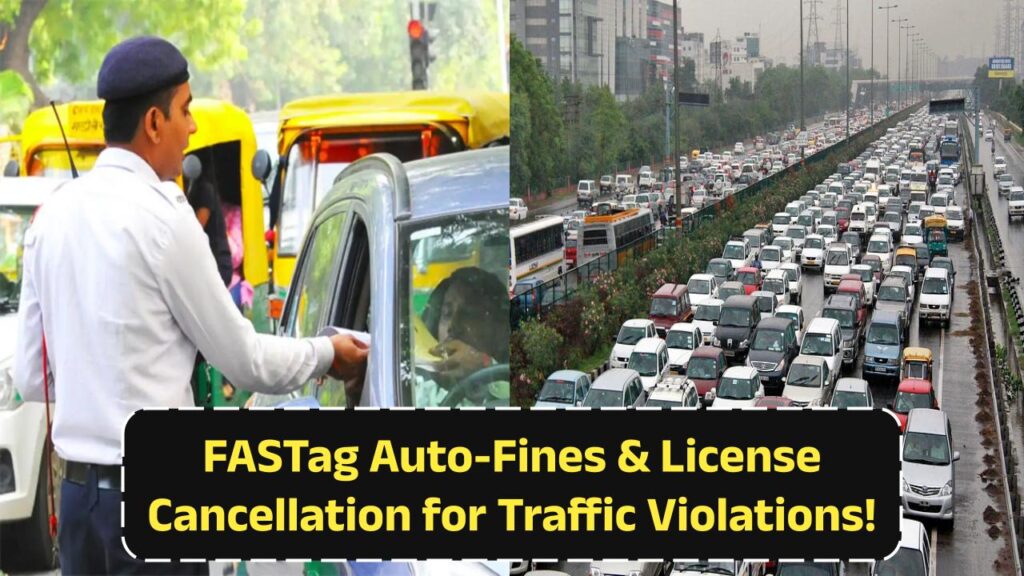
New Traffic Rules ALERT: The Indian government is stepping up road safety enforcement with a new traffic rule that integrates FASTag technology to automatically fine violators and even revoke their driving licenses. If you’re not wearing a helmet while riding a bike or a seat belt while driving, you might get penalized without any police intervention.
This automated system is designed to enhance road safety, reduce traffic violations, and ensure stricter compliance with traffic rules. In this article, we’ll break down how this system works, what the implications are, and how you can avoid penalties.
New Traffic Rules ALERT
| Topic | Details |
|---|---|
| New Rule | FASTag will auto-deduct fines for not wearing seat belts or helmets. |
| Penalty Amount | ₹1,000 for seat belt violations, ₹1,000 + license suspension for helmet violations. |
| Implementation | Proposed in Uttar Pradesh, other states may follow. |
| Authority | Ministry of Road Transport & Highways, India. |
| Privacy Concerns | Critics argue about surveillance and data security risks. |
| Official Website | Ministry of Road Transport & Highways |
The integration of FASTag for automatic fine deductions is a game-changer in traffic enforcement. While it promotes road safety and discipline, concerns around privacy, incorrect fines, and public acceptance must be addressed. As the Indian government continues its road safety mission, compliance with helmet and seat belt laws will be crucial in avoiding penalties and protecting lives.
How FASTag Will Auto Fine You
FASTag, which was initially introduced to automate toll collection, is now being explored as a tool for automated fine deduction. Here’s how the system works:
- CCTV & AI-Based Surveillance – Traffic cameras and AI-driven surveillance will monitor vehicles in real-time.
- License Plate Recognition (LPR) – If a driver or rider is caught without a seat belt or helmet, the system captures the vehicle details.
- Linking FASTag Accounts – The violator’s FASTag account is identified using the registration number.
- Automatic Fine Deduction – A penalty is automatically deducted from the FASTag balance.
- Repeat Offenses – Frequent violations may lead to license cancellation or suspension.
Where Is This Being Implemented?
Currently, Uttar Pradesh is leading the way with this initiative, and other states may soon follow. In Bengaluru, similar proposals were discussed for speeding violations.
New FASTag rules from Monday: 60 Minutes Can Decide Your Toll Charges! Learn how it affects you
No More Hassle of Frequent FASTag Recharges! Government to Introduce a New Toll Tax Rule
Big Change: Income Tax Bill 2025 to Tax Farming & Dairy Earnings!
Why Is This Rule Being Introduced?
The Indian government aims to reduce road fatalities caused by negligence. According to the Ministry of Road Transport & Highways:
- 60% of road accident deaths in India involve two-wheelers, often due to not wearing helmets.
- Over 30% of car accident deaths are linked to not using seat belts.
- Road accidents cost India ₹4 lakh crore annually in medical expenses and productivity loss.
By automating the fine process, authorities hope to:
Increase compliance with safety laws. Reduce human intervention in traffic enforcement. Ensure consistent penalties for all violators. Improve road safety and reduce fatalities.
What Are the Fines & Penalties?
| Violation | Penalty |
| Not wearing a helmet (two-wheelers) | ₹1,000 + 3-month license suspension |
| Not wearing a seat belt (four-wheelers) | ₹1,000 |
| Repeat Offenses | Increased fines + possible license cancellation |
| Tampering with FASTag to avoid fines | Legal action & ban from road usage |
Concerns & Challenges
While this move promotes road safety, it has sparked debates about privacy, data security, and fairness.
1. Privacy Issues
Critics argue that using FASTag to monitor violations could lead to mass surveillance and data misuse.
2. False Fines & Technical Errors
What if you are wrongly fined? Technical glitches in AI-based surveillance could lead to incorrect fines.
3. Financial Burden on Citizens
For daily commuters, auto-deductions could cause inconvenience if the FASTag balance is low.
4. Legal Implications
If implemented without proper regulations and a redressal system, the move could lead to legal challenges.
What’s the Solution? Authorities must ensure:
- A robust dispute resolution system for incorrect fines.
- Data protection measures to prevent misuse.
- Public awareness campaigns to educate citizens.
- Legal clarity and government accountability to prevent wrongful enforcement.
How to Avoid Fines & Stay Compliant
1. Always Wear a Helmet (Two-Wheelers)
- Choose a ISI-certified helmet.
- Ensure the strap is fastened securely.
2. Always Wear a Seat Belt (Four-Wheelers)
- Both driver & passengers must wear seat belts.
- Check if the seat belt locks properly.
3. Keep Your FASTag & Vehicle Details Updated
- Ensure your FASTag is linked to the correct vehicle.
- Keep sufficient balance in your FASTag to avoid issues.
4. Follow Traffic Laws
- Follow speed limits and traffic signals.
- Avoid reckless driving and obey road rules.
FAQs On New Traffic Rules ALERT
1. Can FASTag really deduct fines automatically?
Yes, if the system detects a seat belt or helmet violation, the penalty will be deducted from your FASTag account.
2. What happens if I don’t have a FASTag?
If your vehicle doesn’t have a FASTag, the fine will be linked to your vehicle registration number, and you may receive a notice.
3. Can I challenge a wrongly deducted fine?
Yes, there will be a dispute resolution system where you can file complaints.
4. Is this rule applicable across all states?
Currently, it is proposed in Uttar Pradesh, but other states may follow.
5. Can my driving license really get canceled?
For repeat violations, authorities have the power to suspend or cancel licenses.







